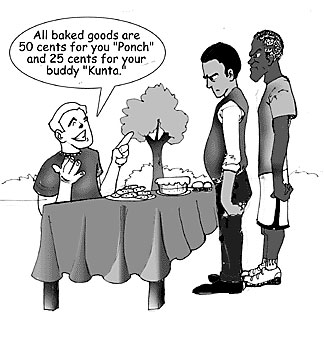
Illustration by Arnie Bermudez
|
|
By Brett Berry
Arizona Daily Wildcat
Tuesday, February 24, 2004
Print this
If you've been following the news lately, you've seen some renewed interest in the controversial topic of affirmative action and its place in today's colleges and universities.
Conservative student groups across the country are trying to push the issue back to the forefront of national discussion. They have spent too many generations fighting to survive in this minority-controlled world; they have begun to rise against their minority oppressors!
Last week, the University of Colorado College Republicans protested affirmative action in the same way their fellow freedom fighters across American campuses have: They held a bake sale.
White and Asian students were charged $1 per cookie, whereas Hispanics paid only 50 cents and blacks only 25 cents. That's supposed to make the point that affirmative action makes it so minorities are unfairly favored at the expense of whites.
Dylan Reeves, the former chairman of the College Republicans of the University of Alabama, called affirmative action "the most heinous and despotic type of discrimination in the history, and future, of our government."
Maybe I'm wrong, but I can think of at least a few historic cases and time periods that would maybe qualify as being more heinous than affirmative action. Maybe Reeves just missed the lectures on slavery, Dred Scott and a few of those constitutional amendments and civil rights acts.
Two weeks ago, the College Republicans at Roger Williams University offered up a "whites only" scholarship to students as a form of protest of affirmative action. The $250 scholarship requires applicants to submit a 100-word essay on "Why you are proud of your white heritage." The application also requires a recent photograph to "confirm whiteness" and states that "evidence of bleaching will disqualify applicants."
I can't speak for all white people, but I'm not so proud of the way my white ancestors have acted in this country.
Perhaps some of these College Republicans at RWU are related to the late Strom Thurmond and are proud of his rich and long history in politics. He is, in fact, the record-holder for the longest filibuster in American history. He led a strong filibuster in 1957 to block proposed legislation that lasted more than 24 hours!
What was the issue that aroused such passion in him to fight a bill to such an extreme? It was one of those discriminatory laws promising black people equal rights and protections.
Maybe these students are proud of that aspect of their heritage. Or maybe they're just proud of the near-elimination of American Indians who stood in the way of Manifest Destiny. Or maybe they are proud of the institutional poverty inflicted on minorities who live in the slums of American cities and face substandard housing, protection and education on a daily basis.
Affirmative action, though, is not meant to serve as reparation for the deeds of our ancestors; its goal is to provide minorities the possibility of higher education and a chance to advance in society. It is a tool used to promote diversity in places other than the lower-class neighborhoods of America.
Of course, in a perfect world, there would be no need for affirmative action practices. Everyone would start on an even playing field and would be given the same opportunities as everyone else.
Undoubtedly, those opposed to affirmative action would argue that it is no longer necessary, that our society has evolved enough to make its practice unfairly biased against the whites of America.
The problem, though, is that America is not a level playing field. After being so blatantly mistreated and pushed down in society, the minority populations of today face a nasty cycle: Living in a poor neighborhood means attending a poor school, which means not getting into a good college (if any), which means not getting a good job, which means living in a poor neighborhood Ě and so the cycle goes.
Affirmative action gives the minorities of America a shot at moving up in society and getting out of the poverty cycle that grips inner cities. It, admittedly, creates "reverse discrimination," but it also helps to counter the inequity of our society. Affirmative action may not be the best way of doing this, but at least it's something.
Unless America is willing to revamp the national education system and put money back into the inner cities from the suburbs, minorities living there will never have the opportunities whites possess, and there will, unfortunately, always be a need for affirmative action.
Brett Berry is a white, middle-class male who was screwed on scholarships but holds no grievances. He can be reached at letters@wildcat.arizona.edu.
